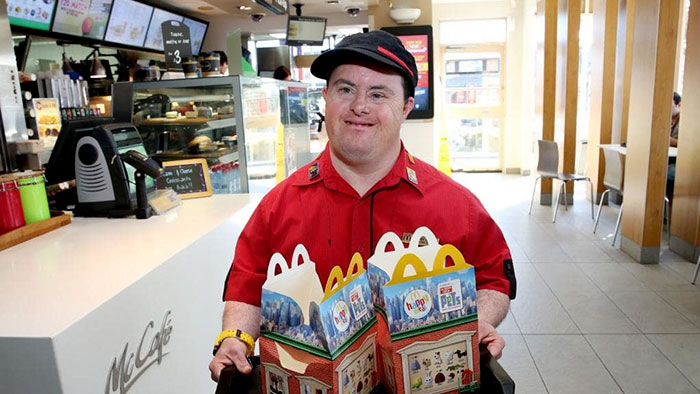Starting last month, ten youngsters with Down Syndrome have a full time job in “X 21” café in Prishtina. Several local and international organizations, “Down Syndrome Kosova”, “Rugova Water”, “USAID”, German organization “HELP”, among others, helped the opening of this café, where only tea and coffee is served.
According to Sebahate Beqiri, the executive director of the NGO “Down Syndrome Kosova”, the aim of this café is to help prepare these youngsters for the job market, be that public or private.
“This café makes possible the employment of people with Down Syndrome and supports other activities of this NGO”, says Beqiri.
One of the few projects of its kind, it’s a very important step towards the integration into Kosovar society of people with Down Syndrome. This café is open from Monday to Friday to everyone who indirectly, by having a cup of coffee or by drinking tea, and by interacting with each other, in an environment free of prejudice, help those with Down Syndromes.
Even though the café is usually packed with people of different ages, the support for these people is still lacking.
Labinota Rrahmani, who has a distant relative with Down Syndrome, shares this view. These youngsters, she says, do not have much support from the society, and many youngsters of her relative’s age ae reluctant to socialize with him.
“People with this syndrome resonate happiness every time they accomplish something, and I cannot understand people who do not accept them in their circle of friends”, says Rrahmani.
According to her, the integration of people with Down Syndrome is facilitated from different activities that are organized by “Down Syndrome Kosova”.
Beqiri from “Down Syndrome Kosova” talks about the lack of institutional commitment when it comes to education and employment of these people. According to this association, only 10% of the overall number of children with Down Syndrome is integrated in the educational system.
This is one of the reasons why, jointly with the NGO “ Klubi Deshira” (Desire Club), this association recently launched a project for honey packing targeted for the Kosovar market. This project made possible the employment of 40 people with Down Syndrome. The NGO is a day care centre for rehabilitation of people with different problems, aimed at helping them integrate into the society.
According to its data, “Down Syndrome Kosova” claims that there are 900 people with Down Syndrome in Kosova, with only 4 employed in private companies and none in public institutions, leaving aside those employed in the projects of this particular organization.
One of them is working in the cafeteria of “Uje Rugova” (Rugova Water) in Peja. Rugova Corporation, in cooperation with the advertising agency “Republika” from Prishtina, carried out the campaign “1 like, 10 cents”, dedicated to people with Down Syndrome. A total amount reached at the end of this campaign was 10,000 euro, that were delivered to Down Syndrome Kosova.
According to the advertising executive of this company, Rina Kapiti, this campaign was aimed at raising the awareness among citizens regarding this category of our society.
“Back in 2014 Rugova Corporation had committed to financially supporting and aiding the non-governmental organization “ Down Syndrome Kosova” throughout that year”, says Kapiti.
Another activity of “Rugova Water” was the launch of 1,000,000 0.5 liter bottles in the market, designed by the children from “Down Syndrome Kosova”. For each bottle sold, Rugova Corporation donated 1 cent to this NGO. This activity was promoted in media and billboards by the photographer Arton Humolli and a group of artists in Kosovo.
“Down Syndrome Kosova” puts out on the market handmade cards with various designs. The cards created by people with Down Syndrome, are sold in different places, whereas for holidays they are also sold in the Prishtina main Square. Consequently, this organization ends up with revenue to cover its operational costs.
Xhenete Hasani








